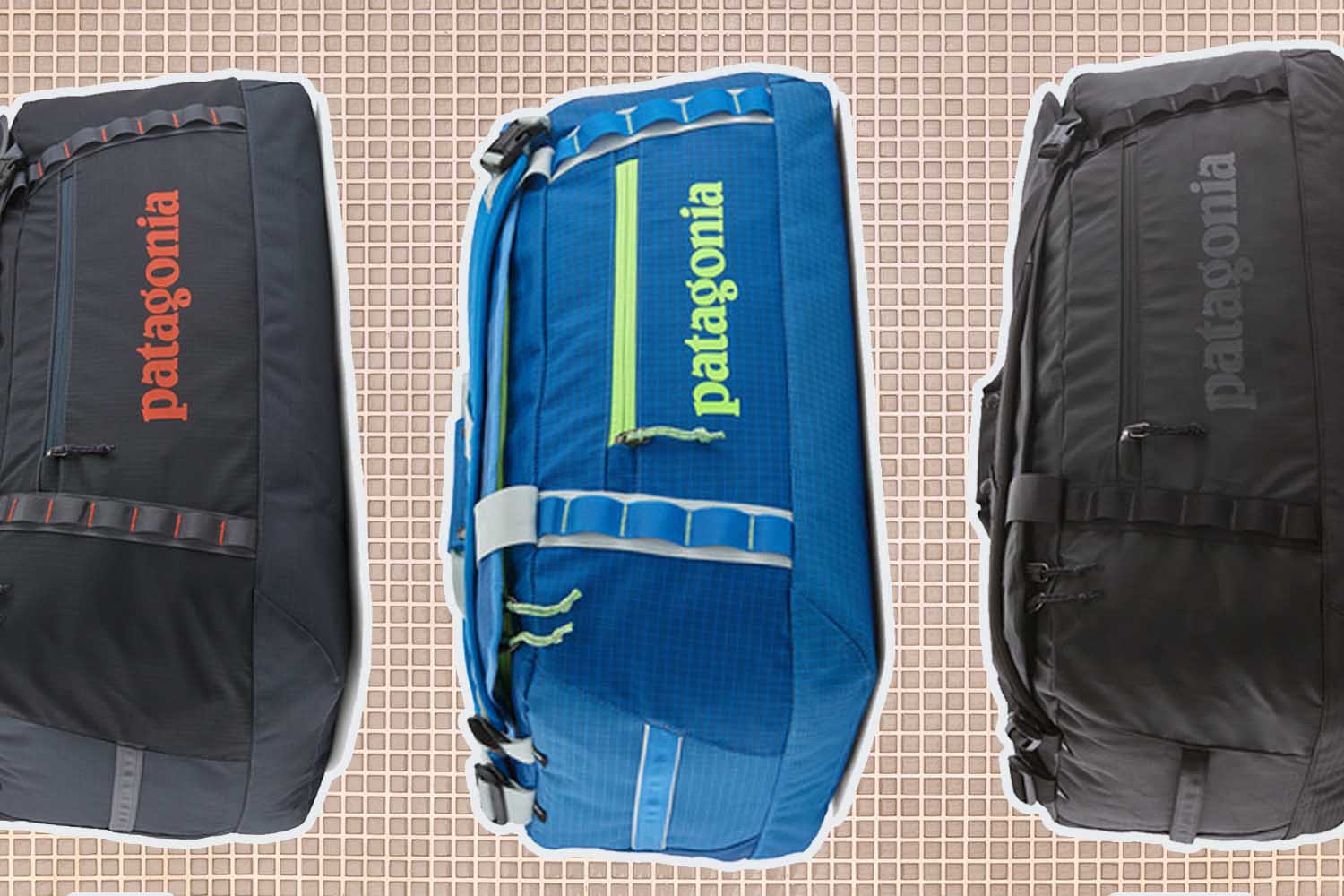In the airport of any outdoor town, it’s almost inevitable that you’ll see one of Patagonia’s Black Hole Duffels winding its way along the luggage carousel. The bags have become a go-to for outdoor travelers (or business travelers who like to give a nod to their downtime passions) and are the duffel of choice for many seasoned travelers around the world. And for good reason — they carry comfortably even when fully loaded, hold up well to rogue luggage handlers and boast a bevy of comfortable features which make the difference on long travel days. (My personal favorite? Some of the comfiest shoulder straps I’ve seen on the market.)
My Black Hole bags have seen six continents, probably far too many random dirt airstrips, and more than one nosy customs agent. They’re still going strong, and for that reason I’m a fan. I still get a little jolt of happiness every time I see them come down the luggage carousel. Good, they made it. On to the adventure. It’s why I was particularly excited to see Patagonia release an update to the beloved bags, just in time to plan for 2024 adventures on the horizon.
So, What’s New?
Rest assured the new Black Hole Duffels perform as well as previous versions. Patagonia has shifted the fabric from virgin to 100% recycled TPU, helping decrease the brand’s dependence on virgin petroleum while still maintaining the weather-resistant, durable performance we’ve come to expect from the bag series.
So, what exactly is TPU and why does it matter? TPU (thermoplastic polyurethane) is a laminate applied to material, and a key component of what makes the duffels able to withstand rain showers, crusty baggage handlers, and being slung around hotel rooms. That laminate keeps the bags durable and trustworthy, so it’s not something we can simply do without. In this update to the series, however, Patagonia is now purchasing TPU “waste” from factories and recycling it into the Black Hole series. This recycling process decreased carbon emissions from manufacturing by 89% per kilogram as compared to using virgin TPU—no small number. The recycled material gives the bags their new matte finish, a different look compared to the shiny coating of the old models.
You can read more about the impact of using recycled TPU — and the reasons why it’s a good fit for the Black Hole line — on Patagonia’s website.
The brand has long been vocal about its desire for customers to repair their gear, be it clothing or bags, instead of simply buying new products. That ethos has led Patagonia to now stock Black Hole repair components in the company’s Reno, Nevada, repair center. Bags can be sent in and quickly given a new panel, saving the bag’s owner the purchase of a new duffel while keeping the material in use instead of in the landfill.
Black Hole Duffel 101
What makes the Black Hole Duffels so good? After all, there are literally hundreds of other duffel bags on the market, so why are these any different?
I’ve already given a nod in the opening of this article to my favorite feature—correctly-contoured and well-padded shoulder straps. I often find myself hiking a fully-loaded Black Hole weighing in at just under airplane allowance weight (aka heavy) into various fishing camps around the world. Last month, I ended up walking more than a mile through the Panama City Airport with my bag on my back while changing terminals. Sure, it wasn’t my favorite activity in the world, but it was made possible by the padded straps which distribute weight surprisingly decently.
As you’d expect from a duffel the interior is fairly minimal, but zippered organizers can be found on the inside of the lid. (I run a couple of the Black Hole Cubes to help keep things organized.) The duffels can either be worn like a backpack using the shoulder straps or carried by more traditional handles. A stow pocket means I can fold the bag up into itself for easy storage when not in use, and exterior daisy chain loops on each corner let me either clip things to the bag (pro tip: keep a carabiner in your bag) or tie the duffel down in the open bag of a truck / inside a small airplane / wherever.
They’re bags designed to get you to the places where the good things happen—where adventure happens—and they do a good job of it.
Choosing the Right Size
Black Hole Duffels come in four different sizes, giving travelers a good range of choices based on trip duration, packing style, and simply personal preference. With sizes ranging from a carry-on friendly 40 liters to an expedition-size 100-liter behemoth, there’s something to suit most travelers.
Patagonia Black Hole Matte Duffel 40L
Ideal as for overnight trips or as a gym bag, the 40-liter duffel meets most airline and train carry-on requirements and carries easily as a lightweight backpack. It’s a favorite of mine for overnight trips or quick weekends in warm climates where I’m not having to pack bulky layers.
Patagonia Black Hole Matte Duffel 55L
Big enough to organize an adventure’s worth of gear for a weekend excursion but compact enough to transfer with ease, the 55L duffel is a great all-arounder for those not worried about lugging a significant volume of gear on extended travel.
Patagonia Black Hole Matte Duffel 100L
The long trip, bring-all-the-gear master. The massive 100-liter Black Hole Duffel is designed with extended travel and gear-hauling in mind. (It’s long enough to fit my fly rod tubes nicely while leaving me plenty of room for clothing, fly boxes, waders, and more.) It’s possible to fit a lot into this duffel, so bear airline weight allowances (and your back) in mind as you’re packing.
This article was featured in the InsideHook newsletter. Sign up now.
